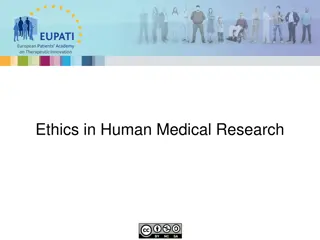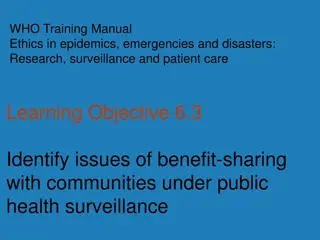Ethics in Nutrition Support: Tube Feed or Not Tube Feed
Explore the ethical principles involved in caring for patients with severe eating disorders or at the end of life in the realm of nutrition support. Learn about determining appropriate nutrition care plan options in challenging scenarios where optimal care is not feasible. Understand the importance
1 views • 19 slides
Evolution of Ethical Principles in Medical Research: A Historical Perspective
Explore the evolution of ethical principles in medical research, from the pioneering works of Hippocrates and Edward Jenner to the post-WWII establishment of principles like voluntary informed consent. Learn about key events such as the Thalidomide scandal and the development of the Declaration of H
1 views • 10 slides
Ethical Principles and Research Misconduct in Clinical Research
This session discusses the essential ethical principles governing clinical research, including respect, justice, beneficence, autonomy, and non-maleficence. It explores key documents like the Belmont Report, Nuremburg Code, and Declaration of Helsinki, emphasizing the importance of ethical conduct i
0 views • 55 slides
Medical Ethics: Principles and Applications
Ethics in the medical field involves moral limitations on power, emphasizing the importance of serving and protecting the vulnerable. Key principles such as autonomy, beneficence, non-maleficence, and justice guide ethical decision-making in healthcare, promoting respect, empathy, and fairness. Vari
1 views • 19 slides
Ethics in Research: Principles and Major Issues
Ethics in research is crucial for ensuring the well-being of participants and upholding moral principles. Key aspects include beneficence, respect for autonomy, informed consent, and freedom from harm. Major ethical issues involve informed consent, beneficence, respect for anonymity and confidential
5 views • 18 slides
Research Ethics: Principles and Application
Research ethics play a crucial role in safeguarding the rights of individuals involved in research activities and maintaining the integrity of the scientific process. This presentation covers the fundamental principles of research ethics - respect for persons, beneficence, and justice - along with p
0 views • 10 slides
Bioethics: Principles and Applications
Ethics is the foundation of bioethics, a field that delves into the ethical considerations surrounding biological and medical practices. From understanding the essence of ethics to applying principles like respect for autonomy and justice, bioethics navigates complex decisions such as allocating a s
0 views • 12 slides
Ethics in Social Work Research: Understanding Human Subjects and Principles
Research on humans presents ethical complexities, requiring adherence to fundamental principles outlined in the Belmont Report: Respect for Persons, Beneficence, and Justice. This chapter explores ethical considerations at various levels and emphasizes the importance of ethical conduct in social wor
0 views • 12 slides
Ethical Principles in Medicine: From Hippocrates to HIPAA
Explore the evolution of ethics in medicine from the ancient Hippocratic Oath to modern-day codes of ethics. Learn about the core principles of autonomy, beneficence, non-maleficence, and justice that guide healthcare professionals. Discover the role of ethics in upholding patient rights, confidenti
0 views • 69 slides
Ethics in Epidemics: Benefit Sharing in Public Health Surveillance
Benefit sharing in public health surveillance involves distributing advantages or profits derived from resources equitably to ensure justice and prevent exploitation. The concept, originating in the 1970s, emphasizes fair provision of benefits to resource providers, especially those lacking access t
0 views • 17 slides
Ethical Considerations in Doctor-Patient Communication
The debate on whether a doctor should withhold information from a patient revolves around the principles of autonomy versus beneficence. Various ethical viewpoints such as utilitarianism, libertarianism, Kantian moral imperatives, and Aristotelianism are explored. While some argue for disclosing all
0 views • 25 slides
Morality, Ethics, and Arguments in Philosophy
Morality and ethics are interconnected concepts that delve into the principles of right and wrong conduct. They involve disciplined reflection on human moral intuitions and choices. Valid and invalid moral arguments exemplify the importance of drawing evaluative conclusions from facts. Various ethic
0 views • 9 slides
Medical Ethics: Principles and Importance
Ethics in medicine is vital for guiding healthcare professionals in their interactions with patients, colleagues, and society. It encompasses moral values, legal responsibilities, and principles such as non-malfeasance, beneficence, autonomy, and justice. Ignorance of medical ethics can lead to negl
0 views • 30 slides
Ethics and Values in Counselling and Psychotherapy
The field of counselling and psychotherapy is guided by key values, ethical principles, and professional standards aimed at respecting human rights, enhancing relationships, and promoting personal well-being. Recent developments, such as the potential introduction of statutory regulation, highlight
0 views • 19 slides
Ethical Issues in Clinical Psychology: Understanding the APA Code of Ethics
Explore the ethical considerations in clinical psychology outlined by the APA Code of Ethics. Key topics covered include confidentiality, informed consent, competence, and more. Learn about the aspirational and enforceable aspects of the code, ethical principles such as beneficence and integrity, an
0 views • 24 slides
Informed Consent in Clinical Trials
Informed consent in clinical research is a foundational principle of research ethics, involving the communication process, respect for participant rights, and ethical principles such as autonomy, beneficence, justice, and solidarity. Participants have core rights that need to be upheld, including se
0 views • 54 slides
Ethics and Research Misconduct: A Course on Ethical Principles in Clinical Research
This course session covers essential topics related to ethics and research misconduct in clinical research, including definitions, ethical principles, key reports, and scenarios. The session emphasizes the importance of upholding ethical standards, such as respect, justice, beneficence, and accounta
0 views • 54 slides
Ethics in Research and Conduct Certification Exam Preparation Course
This course session focuses on ethics and research misconduct, providing valuable handouts on ethical principles, definitions, scenarios, and multiple-choice questions. It covers the foundations for ethical conduct in clinical research, emphasizing values, norms, and guidelines for responsible resea
3 views • 54 slides

















